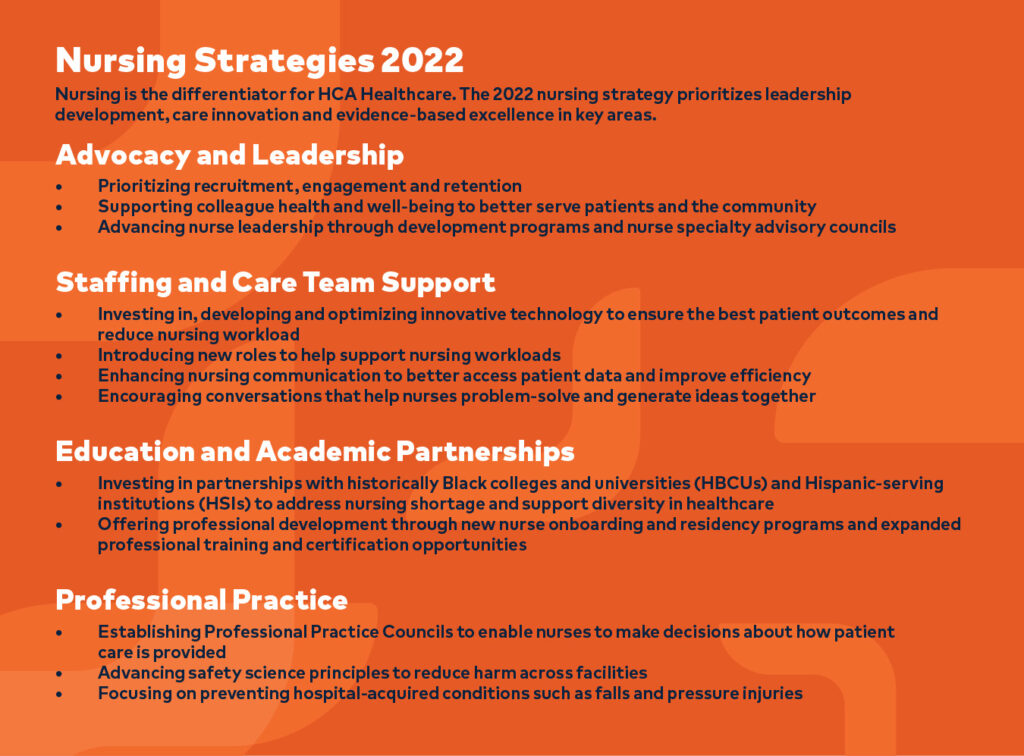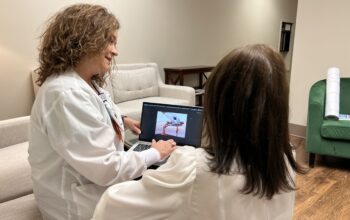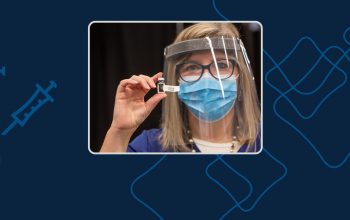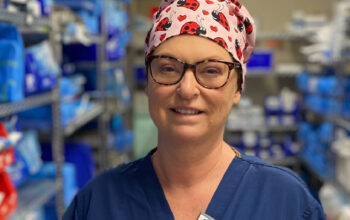Nurse leader Amanda Skeen furthers the connection between new nursing strategies and how they are improving patient care.


Amanda Skeen was compelled to pursue nursing because of her own NICU (Neonatal Intensive Care Unit) experience after her daughter was born. She received such great care that she wanted to provide the same for other families. Now, in her 12th year of nursing, she says her career has been everything she hoped for and more.
Currently the clinical manager, Neonatal Intensive Care Unit at HCA Florida Capital Hospital, she has cared for babies born as early as 22 weeks and so fragile she was afraid to leave their bedside. Now, some of those babies are celebrating birthdays, going to dances and starting middle school.
Read more about her career and how she believes HCA Healthcare’s nursing strategies support caregivers and the patients they serve.
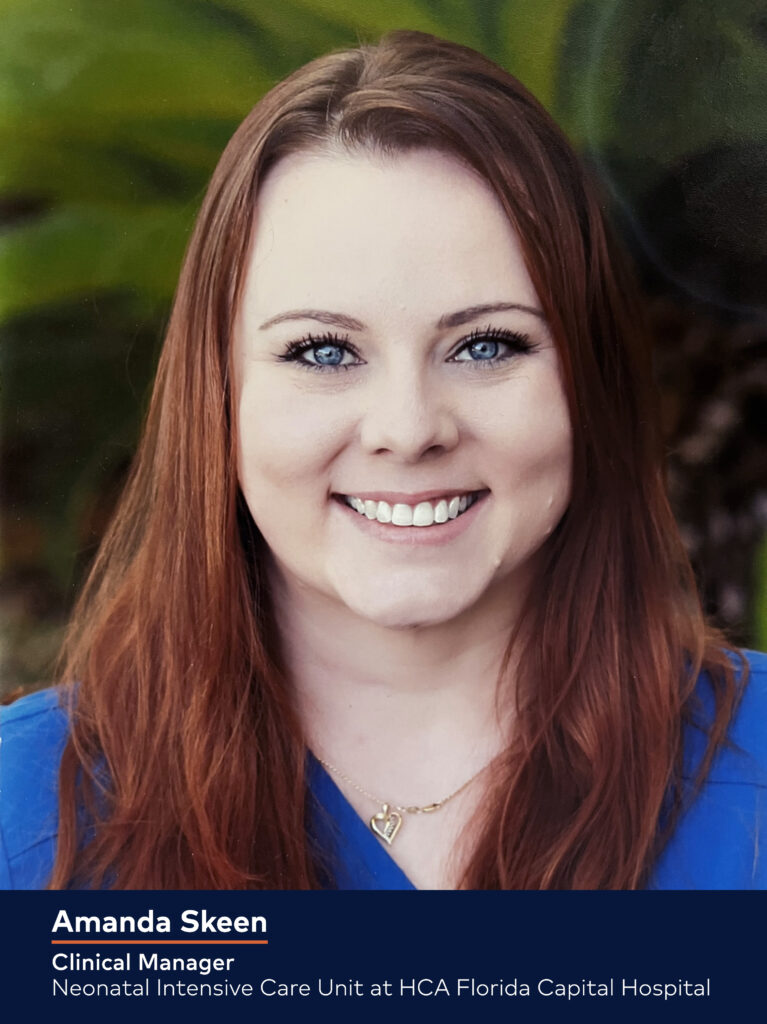
Why did you become a nurse?
I actually decided to go to nursing school as a direct result of a personal experience. I was a first-time mom. I was a very young mom, and my daughter ended up being in the NICU for about a week. And in that time, I realized this is what I’m supposed to do with my life. So the next year I started working toward my nursing degree.
What were some specific things that compelled you to make that decision?
For me, I had always known that I wanted to work with children in some capacity, and the medical field had always been in the back of my mind. But during that weeklong stay, seeing how the nurses interacted with the families and how the nurses cared for the babies — I realized, this is what I want to do.
I want to be able to have a great positive impact on these families during this most precious and fragile time in their life. They’ve just had this brand-new baby. It’s the most important thing to them, but their baby is sick and they’re scared. The nurses play such a huge role in not only caring for the babies, but also caring for the families. We’re growing them into parents who are going to take these babies home and help them graduate from high school and walk them down the aisle when they get married. And we want to be able to make them feel like when they leave the hospital, they’re ready to take on the rest of the world with that baby. And it’s just such an amazing experience to get to be a part of.
Have you been able to stay connected to some of the babies and families you’ve cared for through the years?
Yeah, it’s always so exciting. You’re talking about babies who are born at 22, 23, 24 weeks. And they spend three months in the hospital. Those families have really deep relationships with you while their kids are there. We do stay in touch. It’s so crazy to me to look now at some of my very first babies going to middle school.
All of those long shifts and those nights where you didn’t leave their bedside because you weren’t sure if the baby was going to make it — now you get to see them going on field trips, having birthday parties and graduating from fifth grade. It’s just so rewarding.
Nurses play such a huge role in not only caring for the babies, but also caring for the families. We’re growing them into parents who are going to take these babies home and help them graduate from high school and walk them down the aisle when they get married.— Amanda Skeen, clinical manager, Neonatal Intensive Care Unit at HCA Florida Capital Hospital.
The last couple of years have been really tough on the healthcare industry. What keeps you going?
It has been tough. But in my world, where you’re still taking care of patients for months at a time — even though it’s harder — you still build those same relationships. So it almost makes it even more rewarding when you know that the parent is still leaving with a positive experience, despite all the obstacles.
What prompted your decision to leave the bedside for the role of a clinical manager?
The change for me came with the opportunity in our community. I’ve grown up in this community. I’ve lived here my whole life. There’s only ever been one NICU in our city.
So now that HCA Florida Capital Hospital has opened a NICU, I wanted to make sure that this NICU was fantastic. Our nurses are highly qualified, and we’re here to treat you like our family. For me, I made the change because I wanted to provide something really great for our community.
How do the new nursing strategies affect your role?
One thing that we’re doing that’s making a huge impact is recruiting nurse externs and growing those externs into becoming really great nurses who join our team when they graduate. That’s a great opportunity because the NICU, generally, is one of those places where people don’t expect to get hired right out of school.
If you come in as an extern, then you already have some NICU experience. So even though you’re a new grad, you know the workflow, you understand the processes and the basis of why we do things because you’ve been here as an extern for the last six months. It gives us the ability to be able to hire new grads into an ICU role that previously wouldn’t have been allowed.
What are some of the ways that these strategies improve your day-to-day work?
The NICU is part of the women’s service line here. We’re doing the same thing in Labor and Delivery and Postpartum – bringing these externs in and training them while they’re in school. So now that we’re able to bring these externs in and they’re able to get their feet wet, so to speak, in the specialized department while they’re in school and learning — when they come out of school, they have that base knowledge.
It’s a really great opportunity, not only for our units, to help grow our future nurses, but for those nurses who, before, wouldn’t even have been given the opportunity to work in these specialty units for two years coming out of school.
What are the opportunities for midlevel nurses to continue to grow and expand their career under these strategies?
One of the biggest things recently that they’ve launched at our hospital is the CNC program, or the care nurse coordinator program. It’s a step up from charge nurse, which is moving into leadership. It gives the veteran nurses who’ve been here for a while a chance to move up into the next step of leadership while they’re still working on the unit.
They’re still providing patient care sometimes, but they also get to kind of break into some of the administrative things like the meetings that we go to, the planning that we do, seeing how we look at budgeting and staffing, and how those things affect the overall picture. That program has been huge for those veteran nurses to be able to move into the next leadership role and start growing their career.
At the end of the day, all of us are here to make sure that the patients are taken care of. And no matter what role we fill in the hospital, we’re all working toward that same goal.— Amanda Skeen, clinical manager, Neonatal Intensive Care Unit at HCA Florida Capital Hospital.
How do you see these strategies shaping the future of nursing at HCA Healthcare?
I think that bringing LPNs back into the hospital setting is going to be huge. Not only do they provide so much support for the nursing staff on the floors, but a lot of the LPNs who work in these hospital settings eventually go back to school into an RN program. That brings more RNs into our staff, because if they’re already working here as an LPN, odds are once they are RNs, they’ll stay with us. They’ve been here, and they’ve had a great learning experience. This is their home now. So we’re growing and investing in our future with both the LPNs and the externs.
In what tangible ways are these strategies improving patient care?
I think one of the biggest benefits to patients is the more staff we have, the more faces the patients see who can make their experience a positive one. If the PCT is with another patient, the LPN might not be and they can step in. Or if the LPN and the PCT are both busy, that’s okay because we also still have an RN on this team who can help do those things.
One of the biggest things we’ve seen in rounding with our patients throughout the hospital is that they all say, “We know that y’all are busy, but you’ve still taken great care of us. We’ve appreciated how responsive you are and how friendly everyone is.”
At the end of the day, all of us are here to make sure that the patients are taken care of. And no matter what role we fill in the hospital, we’re all working toward that same goal.
